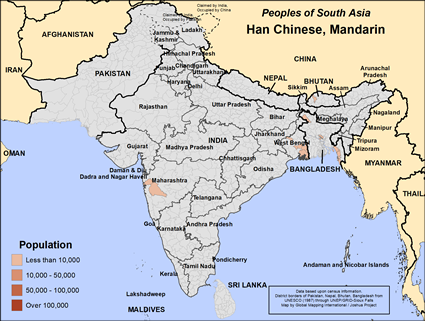The Han Chinese are the largest ethnic group in the world. Although the vast majority live in mainland China, many have immigrated to other countries, and today they reside in nearly every nation of the world.
Most Han Chinese speak one of the many Chinese dialects, which include Mandarin, Cantonese, Hokkien and Min Bei. The speakers of one Chinese dialect cannot understand the speakers of another. The writing system is the same so they can communicate on paper but not orally.
The Han Chinese fled to other countries after the Mongol invasion in 1276. Many other upheavals and conflicts followed, and the Chinese continued to settle in different nations, especially in Southeast Asia. They came in large numbers when Singapore was a British colony. Wherever they went, the Chinese settled almost exclusively in urban areas and became involved in business and commerce. Today, they are very influential in the economies of many of these nations, especially Singapore.
Mandarin Chinese have their own cuisine. It was modified in Singapore where they found different available ingredients.
The Chinese in Singapore have their own newspapers and a strong literary scene. Mandarin speakers have concocted Xinyao, a musical genre unique to Singapore. Chinese festivals are popular, and Singapore has a distinctly Chinese flavor, though it is blended with their English colonial past.
Because Singapore was once a British colony, both the Mandarin and Cantonese Chinese people differed from their counterparts in the PRC. They are more Western in their outlook and much more likely to speak English as a trade language. Their accents differ. They view themselves as Singaporean rather than Chinese, and there is friction with new arrivals from the PRC.
Most Mandarin Chinese in Singapore have maintained the traditional Chinese religion blended with Buddhism. Most identify as Buddhists, though their form of Buddhism is well blended with traditional religion. Their beliefs are centered around the concept of maintaining harmony, something greatly valued by all Chinese people.
Although the Mandarin Chinese claim adherence to these beliefs, they seem to have little effect on their everyday lives. Many are non-religious in their daily practices.
There are strong Christians among Mandarin speakers in Singapore. They can be used by God to disciple many.
Mandarin Chinese people need to take the precious gospel to the Buddhists in Singapore. It will be difficult, but they have a rare opportunity to reach these unreached people.
Pray for Mandarin Chinese Christians to be Christ's ambassadors to Buddhists in Singapore.
Pray for Mandarin workers, filled with the fruit of the Holy Spirit, to disciple others.
Pray for Mandarin speakers to begin a family-based movement to Christ that will bless them abundantly.
Scripture Prayers for the Han Chinese, Mandarin in Singapore.
https://en.wikipedia.org/wiki/Chinese_Singaporeans
| Profile Source: Joshua Project |













